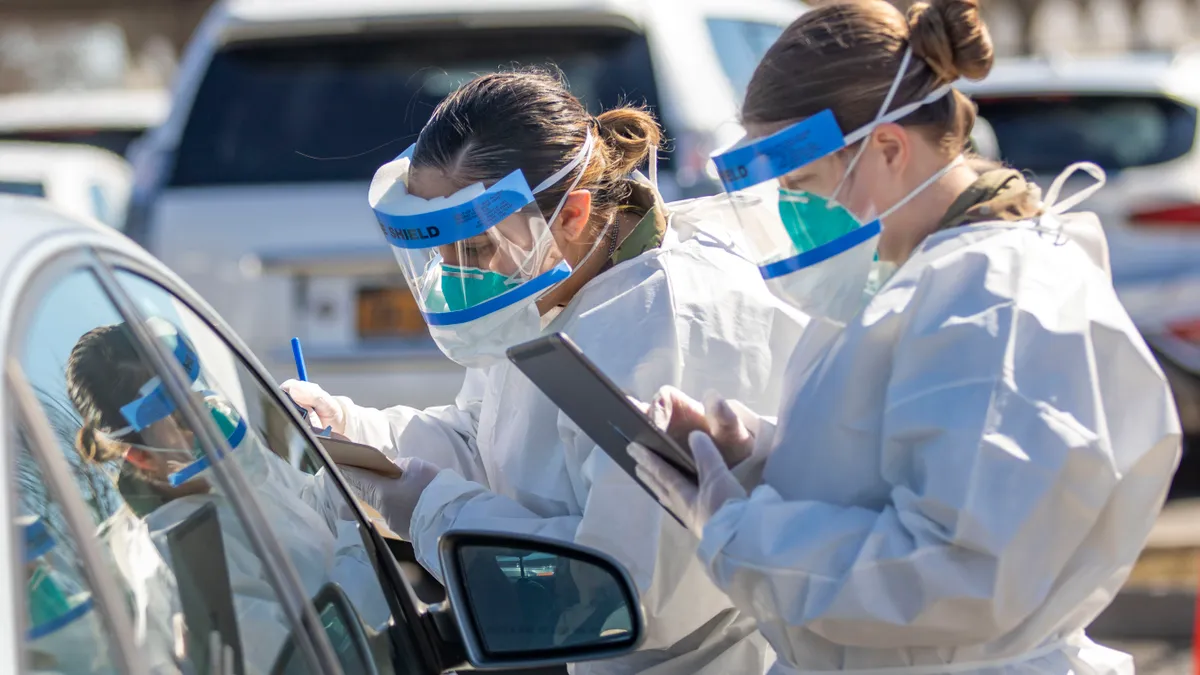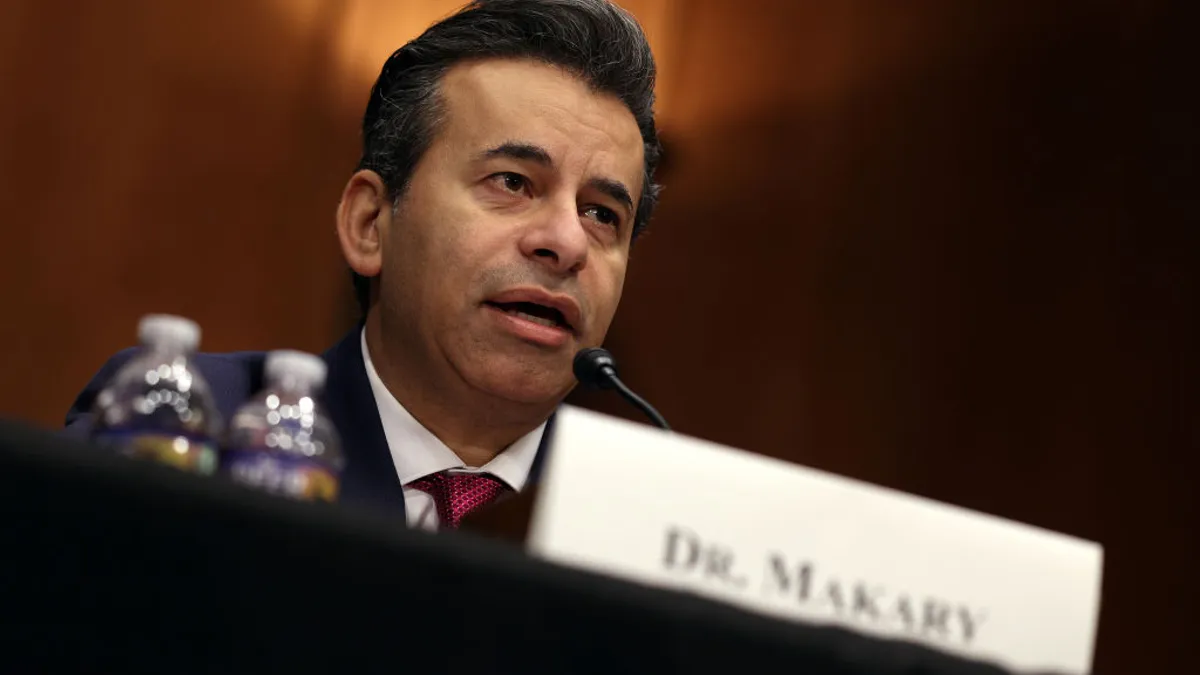Despite the rollout of coronavirus vaccines in 2021, Abbott Laboratories and Quidel are ramping up their manufacturing capabilities in anticipation of another banner year for COVID-19 testing.
Executives from the rival diagnostic makers laid out their coronavirus test plans at this week's virtual J.P. Morgan healthcare conference, as the U.S. continued to set records for COVID-19 cases, deaths and hospitalizations.
Abbott CEO Robert Ford said the company expects high demand and volume for tests throughout 2021. Eyeing the potentially lucrative market, Abbott is near completion of capacity expansion at U.S. manufacturing sites, which Ford estimated will enable production of tens of million more of its BinaxNOW COVID-19 antigen tests per month for sale to schools, workplaces, and pharmacies.
"We built two manufacturing sites here in the U.S. for Binax. We started in May and finished in August, put several hundred million dollars of investment. We now got several hundred million test capacity per quarter," Ford said.
With the vaccine rollout this year, Ford sees COVID-19 testing eventually arriving at an "end state" that looks more like an influenza-like seasonal test.
"I don't see COVID just simply going away but I do see it looking more like a flu-like seasonal test. And if you think about it globally, a flu-like seasonal test for COVID, it's pretty significant amount of volume," Ford added.
Still, the U.S. market for coronavirus tests has been brisk and looks to continue in 2021. Abbott announced on Tuesday it has completed a federal government order for 150 million BinaxNOW Ag Card rapid tests, under a previous $760 million contract, and will supply HHS with an additional 30 million tests through March as part of a new order.
The feds are also dangling the possibility of even more test orders. Assistant Secretary for Health Brett Giroir last week told reporters that HHS has allocated $300 million for the purchase of an additional 60 million Abbott BinaxNOW rapid tests or "equivalent" point of care COVID-19 testing technology.
Quidel could be a potential contender for a piece of that funding.
The company's Sofia COVID-19 rapid point-of-care antigen test in May became the first such diagnostic to get an FDA nod. Last month, the agency granted an emergency use authorization for Quidel's QuickVue SARS test, an instrument-free, pregnancy test-style antigen diagnostic that like Abbott’s BinaxNOW delivers results in minutes at the point of care.
Though Quidel has long focused on the point-of-care market, CEO Doug Bryant said on Wednesday at the J.P. Morgan conference that the company is turning its sights in 2021 to at-home coronavirus testing.
"We are now anticipating a QuickVue SARS OTC at-home approval, which would not require a prescription," Bryant said. "We think it's the future of the company."
Early in 2021, Quidel hopes to have QuickVue tests available as OTC at home products.
In a research note last week, Craig-Hallum analyst Alex Nowak wrote that Quidel's at-home offering is "on track" for approval in the first quarter with an OTC label and could prove to be the "greatest hit yet" for the company.
"The at-home clinical trial is now under way and should be completed within two weeks. Submission will immediately follow and based on management’s conversations with FDA, approval should happen extremely quickly (potentially by the end of January)," Nowak wrote.
Bryant noted on Wednesday that Quidel intends to manufacture as many QuickVue SARS tests that it can in 2021, with an initial production capability of 500,000 to 1 million tests per week once the OTC product launches. Quidel expects manufacture ramp up to 600 million QuickVue tests per year run rate by end of the year.
Abbott is also targeting the at-home testing market. FDA in December issued an emergency use authorization for Abbott's antigen-based BinaxNOW COVID-19 Ag Card Home Test.
"There's an opportunity for at-home testing for people to be able to do their test at home, not have to go to a pharmacy or to a physician's office or hospital," Ford said on Tuesday.
However, the Abbott BinaxNOW COVID-19 Ag Card Home Test is not OTC and requires a prescription for use at home with self-collected nasal swab samples.
FDA priorities
Meanwhile, Tim Stenzel, director of the FDA’s Office of In Vitro Diagnostics and Radiological Health, in a virtual town hall last week said the agency's COVID-19 testing priorities at the start of 2021 include at-home tests and home collection kits, as well as point-of-care diagnostics and tests that can be performed in "super-high volume" in central labs.
"If an application comes in and it’s complete and picks one of these boxes, we will make it a priority to give you feedback as soon as possible and try to authorize these tests as soon as possible," Stenzel added.
He called out Quidel's QuickVue SARS test, which was granted an EUA in late December, noting that it's "a little bit unique" as it is the first antigen dipstick assay authorized for point of care. He said QuickVue SARS joins the Abbott BinaxNOW as "very simple, non-instrumented" and inexpensive antigen tests in the marketplace.
"It can really drive down the cost of the results and because it’s a rapid antigen test it can be produced in high volumes as you might expect, just like the Abbott BinaxNOW," Stenzel added.
Aside from molecular and antigen diagnostics, Stenzel said FDA is also making serology tests a priority that fit in the point of care, home test, and in-home collection categories. However, he cautioned when it comes to COVID-19 vaccines and using antibody tests authorized by the agency to determine immunity in vaccinated individuals.
Stenzel emphasized that FDA has not authorized any serology tests for use with vaccines for any purpose, either to determine whether a vaccine is needed or determine if it has taken effect and provides any sort of immunity.
"In fact, we haven’t even authorized the serology tests around an immunity claim. We have authorized semi-quant serology tests and a neutralizing antibody serology test. Those perhaps could be more useful in assessing at least the question of immunity, not necessarily that anybody can use them right now to declare immunity. That would be something that I think would be a bit dangerous right now," Stenzel said.
Stenzel's warning about serology tests was followed late last week with an FDA alert to clinical laboratory staff and healthcare providers about the impact of the U.K. coronavirus variant and other emerging forms of the virus on the results of certain PCR tests.



















